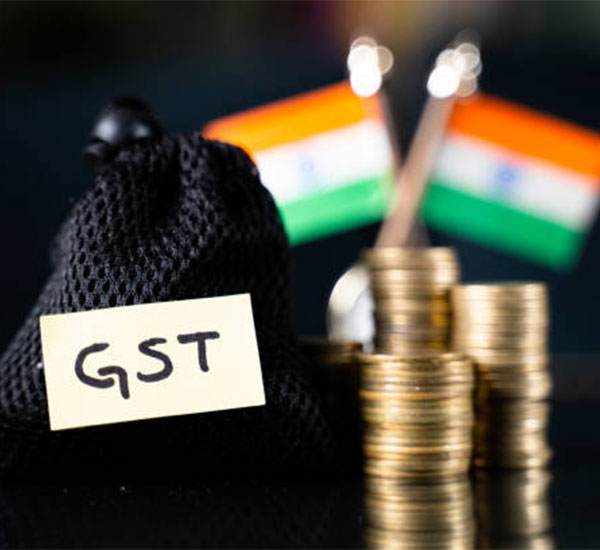
What We Offer
Key Features For Our GST Registration
The Goods and Services Tax (GST), which went into effect on July 1, 2017, affects all Indian service
providers (including independent contractors), retailers, and manufacturers. The GST is an
accumulation of a number of central taxes, including Service Tax, Excise Duty, CST, and state taxes,
including Entertainment Tax, Luxury Tax, Octroi, and VAT. Additionally, to avoid cumbersome GST
requirements and pay GST at a fixed rate of turnover, taxpayers with a turnover of less than 1.5
crore can select a composition scheme.
Along the supply chain, every product goes through a number of steps, including buying the raw
materials, manufacturing, selling to the wholesaler, selling to the retailer, and then selling to
the customer. It's interesting to note that GST will be applied to all 3 levels. Let's assume that
if a product is made in West Bengal but used in Uttar Pradesh, all of the proceeds will go to that
state. Advantages of GST Registration are:
Table Of Contents
Know Everything About GST Registration

Company Registration Process
What Are the Components of GST?
GST has three tax components, namely:
- Central Goods and Services Tax or CGST, it is a central government
- State Goods and Services Tax or SGST which is a state component. Where centre and state will levy GST on all entities for all the transaction in the state
- The Integrated Goods and Services Tax (IGST), to be levied by the centre, i.e. when a transaction happens from one state to another.
Mandatory Documents For Online GST Registration
The list of documents required for registration of GST for various business are as follows:
Proprietorship
- PAN Card and address proof of proprietor
LLP
- PAN Card of LLP
- LLP Agreement
- Partners’ names and address proof
Private Limited Company
- Certificate of Incorporation
- PAN Card of Company
- Articles of Association, AOA
- Memorandum of Association, MOA
- Resolution signed by board members
- Identity and address proof of directors
- Digital Signature
The Following Can Be Shown as Proof of Address of a Director
- Passport
- Voter Identity Card
- Aadhar Card
- Ration Card
- Telephone or Electricity Bill
- Driving License
- Bank Account Statement
Add what works as identity proof, One can use a PAN Card, Aadhar Card as identity proof. For address proof, any of the director’s can show their voters ID, passport, telephone bill, electricity bill and telephone bill.
GST Registration Process
GST registration is a mandatory requirement for businesses in India that exceed specific turnover limits or meet certain business criteria. The process begins by visiting the official GST portal, selecting "New GST Registration", and submitting the necessary business details such as the legal name, state, and PAN number. After OTP verification, a Temporary Reference Number (TRN) is issued. Using the TRN, the applicant must complete the full application, upload required KYC documents, and submit the form with digital verification. Upon verification by a GST officer, the applicant receives an Application Reference Number (ARN) and eventually the GSTIN – the GST Identification Number. The entire process is streamlined and can be completed online with the right guidance. For smooth and error-free submissions, platforms like Madaliya.com offer expert GST registration services, ensuring compliance with Indian tax laws while saving you time and effort.
After successful registration, you will get your GST registration certificate and GSTIN after verification of the GST application and other mandatory GST registration documents by the GST officer. Be aware that no hard copies of the certificate will be issued and the GST certificate can be downloaded from the GST Portal.
Who Needs a GST Registration Service?
Any individual or business involved in the supply of goods or services in India must determine whether GST registration is mandatory. Businesses with an annual turnover exceeding ₹20 lakhs (₹10 lakhs for special category states) must register. Additionally, e-commerce sellers, inter-state suppliers, non-resident taxable persons, and casual taxable persons are all required to register under GST. Even service-based professionals like consultants and freelancers earning above the threshold need GST compliance. Input Service Distributors (ISDs) who allocate input tax credits to multiple branches also fall under the GST regime. If your business was previously registered under VAT, Service Tax, or Excise, transitioning to GST is compulsory. Since legal compliance can be complex, a professional GST registration service like Madaliya.com helps ensure accurate documentation, error-free filing, and timely approval from the GST department.
What is a GST Certificate?
A GST Certificate is an official document issued by the Indian Government upon successful registration under the Goods and Services Tax framework. It acts as a proof of registration and contains essential details like the GSTIN (Goods and Services Tax Identification Number), business name, address, and date of registration. The certificate enables businesses to legally collect GST from customers, issue tax invoices, and claim Input Tax Credit (ITC). It is also a key document while applying for business loans, partnering with larger companies, and participating in government tenders. Unlike older tax systems, GST certificates are not sent as physical copies—they must be downloaded from the GST portal. For new entrepreneurs or businesses unfamiliar with the legal process, Madaliya.com provides step-by-step support to obtain your GST certificate quickly and hassle-free.
What Are the GST Tax Rates?
India’s GST tax rates are structured into different slabs based on the nature of goods and services. The current slabs are 0%, 5%, 12%, 18%, and 28%. Essentials like fresh vegetables, food grains, and medical supplies fall under the 0% rate. Basic goods like processed foods and footwear are taxed at 5%. Items like mobile phones and laptops attract 12% GST, while commonly used electronics such as air conditioners and washing machines are taxed at 18%. Luxury products like tobacco, aerated drinks, and luxury cars attract the highest rate of 28%. Some products have special rates—for example, gold is taxed at 3%, and crude oil at 6%. Services like telecom, insurance, and banking are mostly taxed at 18%. Because GST rates are periodically revised, it’s best to consult platforms like Madaliya.com or check the official GST rate list before invoicing or purchasing.
Benefits of GST Registration
Registering under GST offers multiple benefits to businesses. Firstly, it gives your business a legal identity as a tax-compliant entity, boosting your brand credibility. You can also claim Input Tax Credit (ITC) on your purchases, reducing your overall tax liability. Many banks and NBFCs use GST return filings as proof of business activity while offering loans or credit lines. For businesses looking to expand, supplier onboarding with large corporations often requires a valid GSTIN. Moreover, if you plan to sell on platforms like Amazon, Flipkart, Swiggy, or Zomato, GST registration is mandatory. It also opens the doors to interstate sales without restrictions, allowing you to scale operations nationwide. Lastly, compliance helps avoid penalties and ensures peace of mind. To simplify the process, trust experienced partners like Madaliya.com who offer end-to-end support for GST registration, returns filing, and consultation.
Input Tax Credit: Entities having GST registration are eligible to collect GST from customer for the supply and offset the liability against GST taxes paid while purchasing various goods and services. Hence, GST registration can help you save on taxes and improve margins.

Find Your Answers About GST Registration
Fill The Form to Get Started
Fill The Form to Avail Our Services








